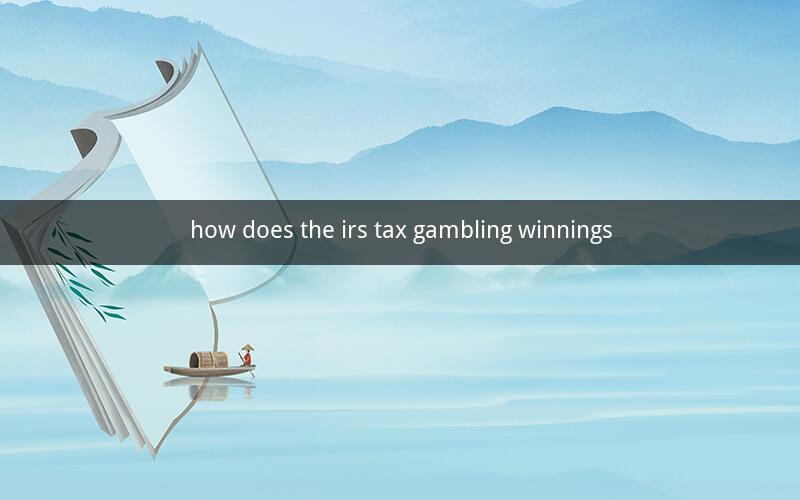
Table of Contents
1. Introduction to IRS Taxation of Gambling Winnings
2. Understanding Taxable Gambling Income
3. Reporting Gambling Winnings to the IRS
4. Tax Rates on Gambling Winnings
5. Withholding of Taxes on Gambling Winnings
6. Filing Requirements for Gambling Winnings
7. Common Mistakes to Avoid When Reporting Gambling Winnings
8. Tax Implications for Professional Gamblers
9. Deductions and Credits for Gambling Expenses
10. Legal Aspects of Taxing Gambling Winnings
1. Introduction to IRS Taxation of Gambling Winnings
Gambling is a popular pastime for many individuals, but it's important to understand the tax implications associated with winning money from gambling activities. The Internal Revenue Service (IRS) considers gambling winnings as taxable income, and it is the responsibility of the winners to report and pay taxes on these earnings.
2. Understanding Taxable Gambling Income
Gambling income includes any money or property received as a result of gambling activities. This can include cash winnings, prizes, and even the fair market value of non-cash prizes. Examples of taxable gambling income include:
- Cash winnings from lotteries, casinos, and horse races
- Winnings from poker tournaments
- Prizes won in contests of skill, such as golf tournaments or chess matches
- Any other form of gambling where you win money or property
3. Reporting Gambling Winnings to the IRS
All gambling winnings must be reported to the IRS, regardless of the amount. This can be done through the following methods:
- Form W-2G: If you win $600 or more in a single cash prize from a gambling establishment, you will receive a Form W-2G. This form must be reported on your tax return.
- Record Keeping: If you do not receive a Form W-2G, you are still required to report your gambling winnings. Keep detailed records of all your gambling activities, including the date, location, type of gambling, and the amount won.
4. Tax Rates on Gambling Winnings
Gambling winnings are taxed at the same rates as other forms of income. The tax rate depends on your overall taxable income and filing status. For example, if you are in the 22% tax bracket, your gambling winnings will be taxed at that rate.
5. Withholding of Taxes on Gambling Winnings
Gambling establishments are required to withhold taxes on certain types of winnings. If you win $5,000 or more in a single cash prize from a gambling establishment, they must withhold 24% of the winnings. This withholding is considered an estimated tax payment and will be applied to your tax liability.
6. Filing Requirements for Gambling Winnings
Gambling winnings must be reported on your tax return using Schedule A (Form 1040) or Schedule C (Form 1040). If you win $600 or more in a single cash prize, you must also include the corresponding Form W-2G with your tax return.
7. Common Mistakes to Avoid When Reporting Gambling Winnings
- Failing to report all gambling winnings
- Not keeping detailed records of gambling activities
- Not including Form W-2G with your tax return
- Failing to pay the correct amount of tax on gambling winnings
8. Tax Implications for Professional Gamblers
Professional gamblers who earn a living from gambling must report their winnings as self-employment income. This means they are subject to self-employment taxes and may be eligible for certain deductions and credits related to their gambling activities.
9. Deductions and Credits for Gambling Expenses
Gamblers may be able to deduct certain expenses related to their gambling activities, such as travel expenses, entry fees, and other gambling-related costs. However, these deductions must be substantiated with receipts and records.
10. Legal Aspects of Taxing Gambling Winnings
The legal aspects of taxing gambling winnings are governed by the Internal Revenue Code (IRC). The IRS has the authority to audit tax returns and assess penalties and interest on underreported or unpaid taxes.
Questions and Answers
1. Question: What is considered gambling income for tax purposes?
- Answer: Gambling income includes any money or property received as a result of gambling activities, such as cash winnings, prizes, and the fair market value of non-cash prizes.
2. Question: Do I have to report gambling winnings if I win less than $600?
- Answer: Yes, all gambling winnings must be reported to the IRS, regardless of the amount.
3. Question: How do I report gambling winnings on my tax return?
- Answer: Report gambling winnings on Schedule A (Form 1040) or Schedule C (Form 1040), and include any Form W-2G you received.
4. Question: Can I deduct my gambling losses on my tax return?
- Answer: Yes, you can deduct gambling losses up to the amount of your gambling winnings. However, you must have detailed records to substantiate these losses.
5. Question: What happens if I don't report my gambling winnings?
- Answer: Failing to report gambling winnings can result in penalties and interest from the IRS.
6. Question: Do I need to pay taxes on non-cash prizes from gambling?
- Answer: Yes, non-cash prizes are considered taxable income and must be reported on your tax return.
7. Question: Can I deduct the cost of a lottery ticket on my tax return?
- Answer: No, the cost of a lottery ticket is not deductible as a gambling expense.
8. Question: What if I win a prize in a contest of skill, such as a chess tournament?
- Answer: Prizes won in contests of skill are considered taxable gambling income.
9. Question: Can I deduct travel expenses related to gambling on my tax return?
- Answer: Yes, you can deduct travel expenses related to gambling if you have substantiating records and are considered a professional gambler.
10. Question: How do I know if I am considered a professional gambler for tax purposes?
- Answer: You are considered a professional gambler if you earn a living from gambling and have a significant amount of gambling income.